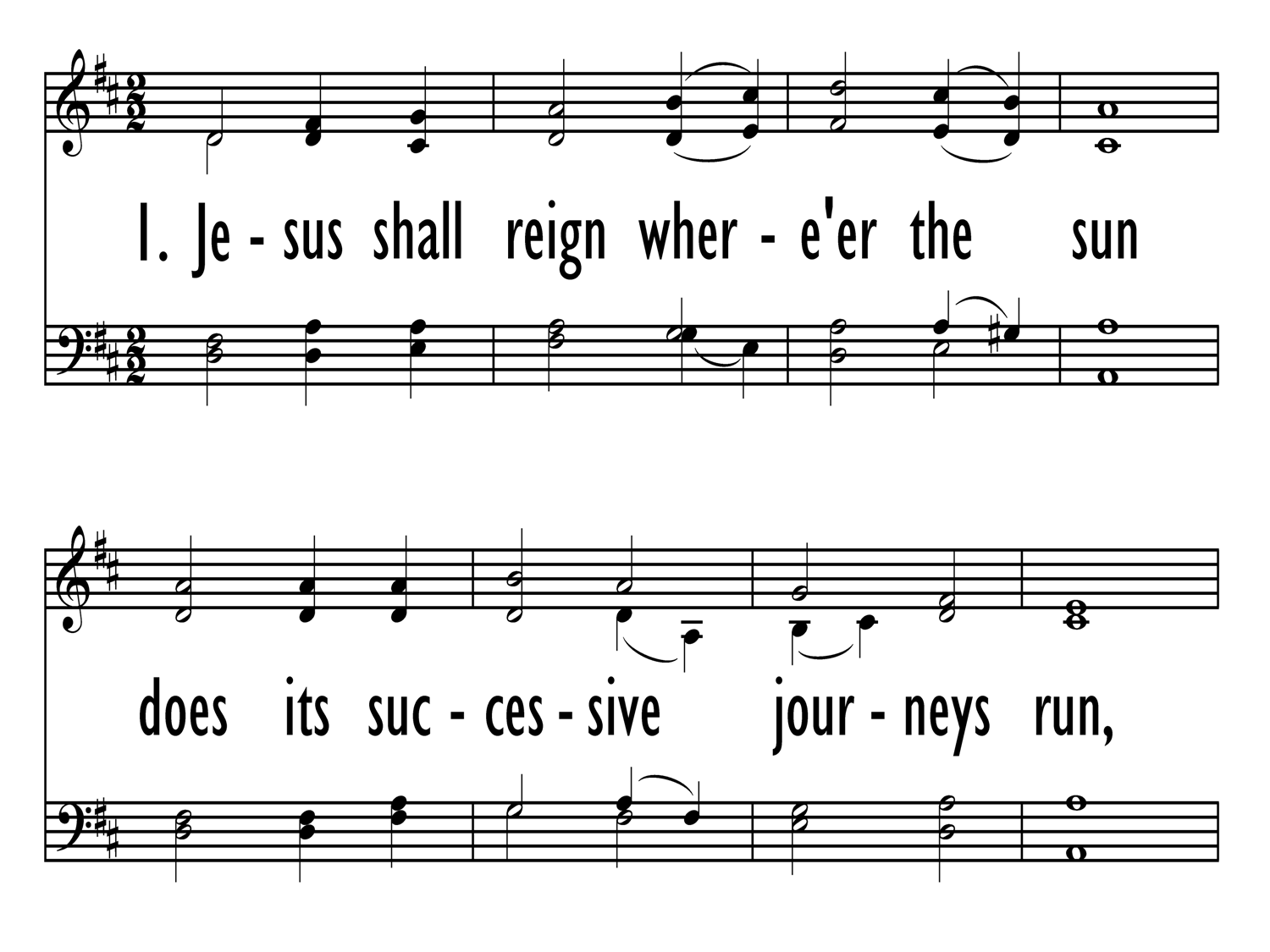Scripture References:
st. 1 = Ps. 72:5, 8, 17
st. 2 = Ps. 72:15
st. 3 = Ps. 72:10-11
st. 4 = Ps. 72:12-14
st. 5 = Ps. 72:19, Rev. 5:11-14
Isaac Watts (PHH 155) based this hymn text on Psalm 72:12-19 and referred to verses 5 and 8 of the psalm as well. (For general comments on this psalm see PHH 72.) Originally in eight stanzas entitled "Christ's Kingdom among the Gentiles," the text was published in Watts' Psalms of David, Imitated (1719). The original stanzas 2, 3, and 7 are omitted, as is customary in modern hymnals.
Watts' text is a strong Christological interpretation of Psalm 72. We sing of the worldwide reign of Christ (st. 1), who is praised by all creatures (st. 2 and 5) , and whose rule results in blessings on people "of every tongue" (st. 3) and redemption for the outcasts (st. 4). The text has a strong missionary focus.
Liturgical Use:
Advent; Epiphany; Ascension; with mission themes; stanza 5 as a doxology; (see also suggestions at PHH 72).
--Psalter Hymnal Handbook
======================
Jesus shall reign where'er the sun. I. Watts. [Foreign Missions.] This is one of the most popular hymns by Watts, and was given in his Psalms of David, 1719, as Pt. ii. of his version of Ps. lxxii., in 8 stanzas of 4 lines. Although it has attained to a high position in modern Hymns, it is rarely found in the collections published before the present cent. It increased in popularity with the growth and development of Foreign Missions, and is now used most extensively in all English-speaking countries. One of the earliest to adopt it for congregational use was Rowland Hill. It is found in his Psalms & Hymns, 1st edition, 1783; but abbreviated to 6 stanzas.
This was followed by some compilers in the Church of England, including Cotterill in Psalms & Hymns, 1810-1820; Bickersteth, 1833, and others; by the Wesleyans in their Supplement, 1830; the Baptists, and other denominations, until at the present day it is given in almost every English hymn-book of any standing or merit. As an example of the way in which The Psalms of David were imitated in the language of the New Testament, by Watts, it is unusually good. It is also in his best style. In modern collections it is generally given in an abbreviated form, ranging from 4 stanzas, as in Hymns Ancient & Modern to 6 stanzas, as in the Wesleyan Hymn Book. Changes are also introduced in the text, but most of these date from the beginning of the present century. It has been rendered in full and in part in many languages, including "Omnibus in terris Dominus rognabit Iesus," by the Rev. R. Bingham, in his Hymnologia Christiana Latina, 1871, p. 103. In this rendering stanzas ii., iii., and vii. are omitted. Mr. G. J. Stevenson gives, in his Methodist Hymn Book Notes, 1883, p. 351, an account of the striking and historical use which was made of this hymn when various islands in the South Seas officially renounced heathenism and embraced Christianity:—
"Perhaps one of the most interesting occasions on which this hymn was used was that on which King George, the sable, of the South Sea Islands, but of blessed memory, gave a new constitution to his people, exchanging a Heathen for a Christian form of government. Under the spreading branches of the banyan trees sat some thousand natives from Tonga, Fiji, and Samoa, on Whitsunday, 1862, assembled for divine worship. Foremost amongst them all sat King George himself. Around him were seated old chiefs and warriors who had shared with him the dangers and fortunes of many a battle; men whose eyes were dim, and whose powerful frames were bowed down with the weight of years. But old and young alike rejoiced together in the joys of that day, their faces most of them radiant with Christian joy, love, and hope. It would be impossible to describe the deep feeling manifested when the solemn service began, by the entire audience singing Dr. Watts's hymn, “Jesus shall reign where'er the sun"... Who so much as they could realize the full meaning of the poet's words? for they had been rescued from the darkness of heathenism and cannibalism, and they were that day met for the first time under a Christian constitution, under a Christian king, and with Christ Himself reigning in the hearts of most of those present. That was indeed Christ's kingdom set up in the earth."
--John Julian, Dictionary of Hymnology (1907)


 My Starred Hymns
My Starred Hymns









